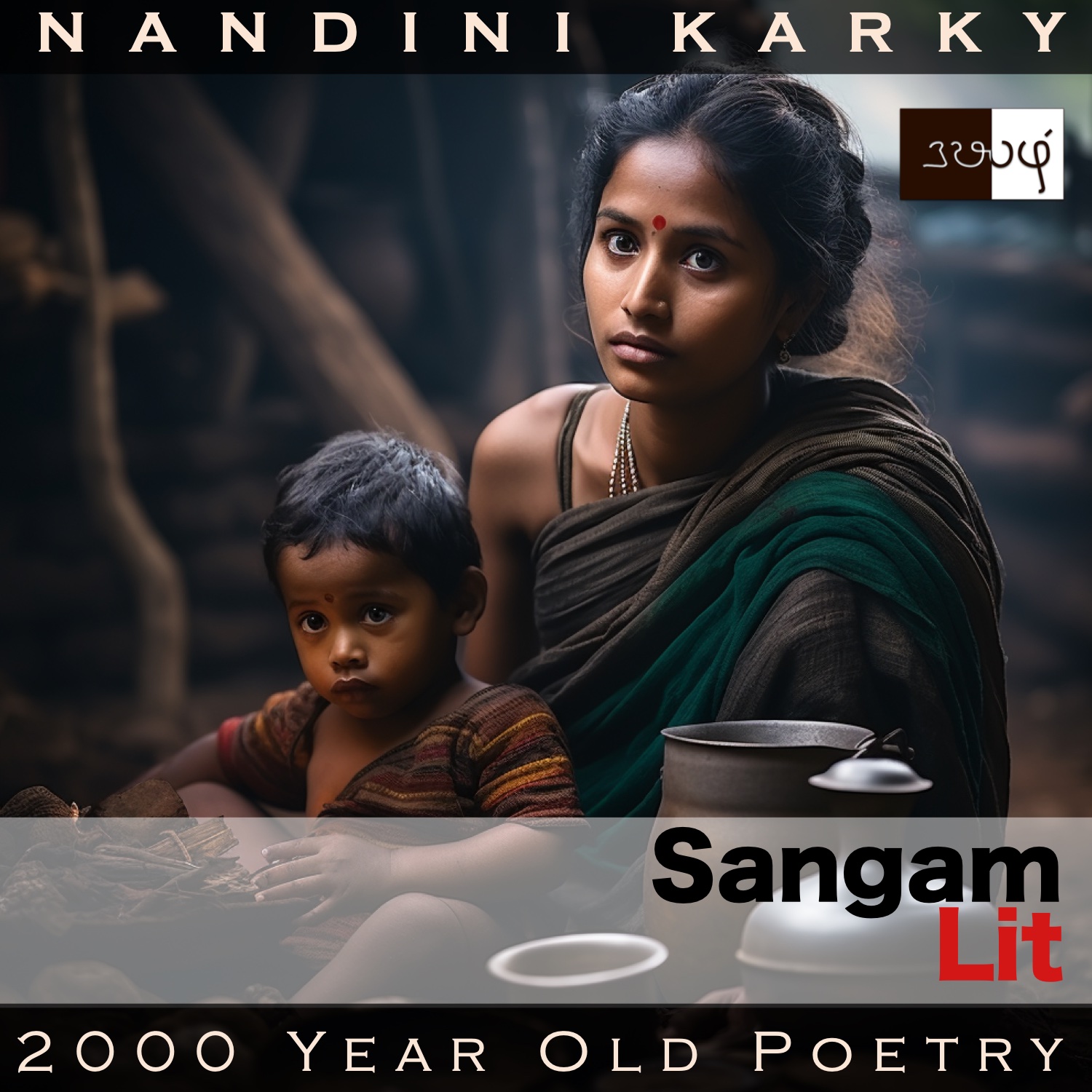Podcast: Play in new window | Download
Subscribe: Apple Podcasts | Spotify | Amazon Music | Android | iHeartRadio | TuneIn | RSS | More
In this episode, we perceive the unyielding attitude of a king, as depicted in Sangam Literary work, Puranaanooru 211, penned about the Chera King Kudakko Cheral Irumporai by the poet Perunkundroor Kizhaar. Set in the category of ‘Paadaan Thinai’ or ‘Praise’, the verse elaborates on the efforts taken to win the grace of this patron.

அஞ்சுவரு மரபின் வெஞ் சினப் புயலேறு
அணங்குடை அரவின் அருந் தலை துமிய,
நின்று காண்பன்ன நீள் மலை மிளிர,
குன்று தூவ எறியும் அரவம் போல,
முரசு எழுந்து இரங்கும் தானையொடு தலைச்சென்று,
அரைசு படக் கடக்கும் உரைசால் தோன்றல்! நின்
உள்ளி வந்த ஓங்கு நிலைப் பரிசிலென்,
‘வள்ளியை ஆதலின் வணங்குவன் இவன்’ என,
கொள்ளா மாந்தர் கொடுமை கூற, நின்
உள்ளியது முடித்தோய் மன்ற; முன் நாள்
கை உள்ளது போல் காட்டி, வழி நாள்
பொய்யொடு நின்ற புறநிலை வருத்தம்
நாணாய் ஆயினும், நாணக் கூறி, என்
நுணங்கு செந் நா அணங்க ஏத்தி,
பாடப் பாடப் பாடுபுகழ் கொண்ட நின்
ஆடு கொள் வியன் மார்பு தொழுதனென் பழிச்சிச்
செல்வல் அத்தை, யானே வைகலும்,
வல்சி இன்மையின் வயின்வயின் மாறி,
இல் எலி மடிந்த தொல் சுவர் வரைப்பின்,
பாஅல் இன்மையின் பல் பாடு சுவைத்து,
முலைக்கோள் மறந்த புதல்வனொடு,
மனைத் தொலைந்திருந்த என் வாள்நுதல் படர்ந்தே.
A long song that sounds like the Part B of the previous song written by the same poet to the same Chera king. The poet’s words can be translated as follows:
“There is the age-old routine of inducing fear, wherein a raging storm strikes and severs heads of fearsome snakes, and that which makes watching mountains standing tall shiver, as it tears apart peaks and resounds with a thunderous sound. Akin to that sound, drums rise and roar as your accompanying army crosses enemy resistance many, O famous heir of great monarchs! With hope about you, I came here, a supplicant of a higher order. Thinking ‘he’s a generous one, and so, I shall bow to him’, I told you about the cruelties of those heartless patrons, and yet you did only what you wanted to. A few days back, you gave the impression that you are about to render unto me, and then the following day, I realised that it was false. Seeing that I stood in sorrow, and yet, you felt no shame about that. Putting you to shame, I shall continue to praise you with songs many about your fame with my nuanced and just tongue. Saluting that triumphant wide chest of yours, I part from you now. Day after day, owing to the lack of food, rats perish on the old walls of my house, and owing to the lack of milk even after suckling many times, my son has forgotten to seek my wife’s breast anymore. Thinking of the shining forehead of my wife, lost at home, I part from thee!”
Let’s take a deeper look at the verse. The poet starts by talking about a phenomenon in the sky, one that has been going on for ages together, one that induces fear, as if something has risen in a mad rage to chop the heads of snakes, and makes even soaring mountains shiver, tearing them apart with flashes of lighting and the resounding sound of thunder. Here, we see another instance of the Sangam belief that thunder and lightning destroyed snakes. Returning, we learn that the poet has evoked this image only to compare it with the war drums of this king that along with a powerful army conquers enemies many. Here, the poet follows their tradition of praising the king’s courage before stating anything else. Then, he comes to the matter at hand and talks about how he, a meritorious poet, came to this king’s court thinking that that he was a generous patron, and even told stories of heartless kings that the poet met before, who never did any good to him. The king seemed so sympathetic and even gave the image that he was going to resolve the poet’s suffering. However, that turned out to be false and even when the poet’s angst was visible for all to see, the king seemed to not mind that, the poet adds.
Let that be, but putting you to even more shame, I shall keep singing your praise endlessly, the poet declares to the king. This reminds me of a technique that I have heard the Japanese follow. When they are angry about the service at an establishment, say a restaurant, they are known to leave behind an extraordinarily high amount as tips. Perhaps it’s the same principle that this poet is following by telling the king that you have not been good to me yet I shall shame you by giving you something that you do not deserve and that is to sing your praise extravagantly. The poet then brings forth the poverty-ridden state of his home, where rats seem to fall dead without finding anything to eat, and his young son has forgotten his mother’s breast for he has not found milk there in long. And so, the poet declares thinking of his wife’s glowing forehead, he’s going to part away. What a pitiable state indeed for an artist of worth! We have seen many poems in which the kings have rendered beyond the wildest dreams of the supplicants, giving them elephants and chariots, and now, we are seeing the other end of the spectrum, where some kings do not relent and render to the poets, no matter their talent or poverty! It’s ironic how the same social restructuring that arose with agriculture and accumulation of wealth in the hands of a few that led to these lasting creations of art also happens to be the reason for those artists’ dependance on the benevolence of the wealthy and the consequent distress of poverty in their life!




Share your thoughts...